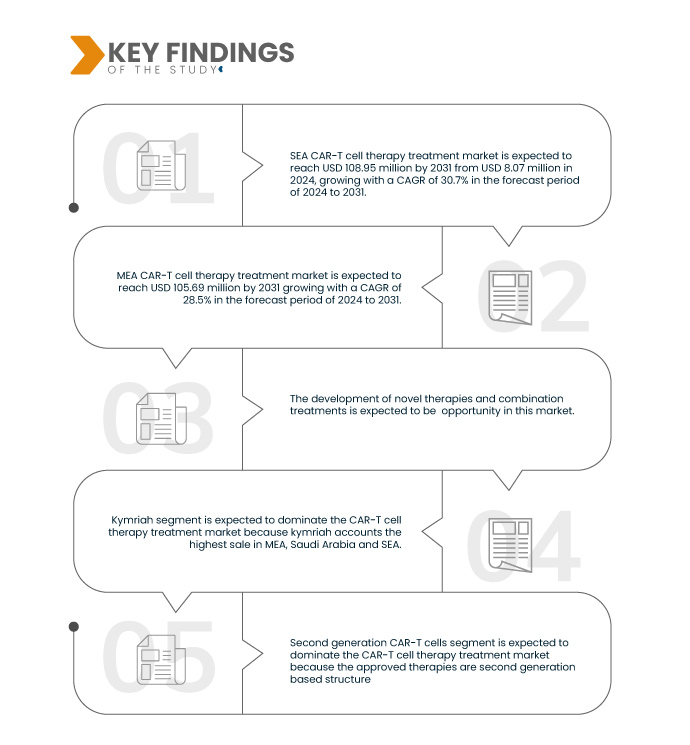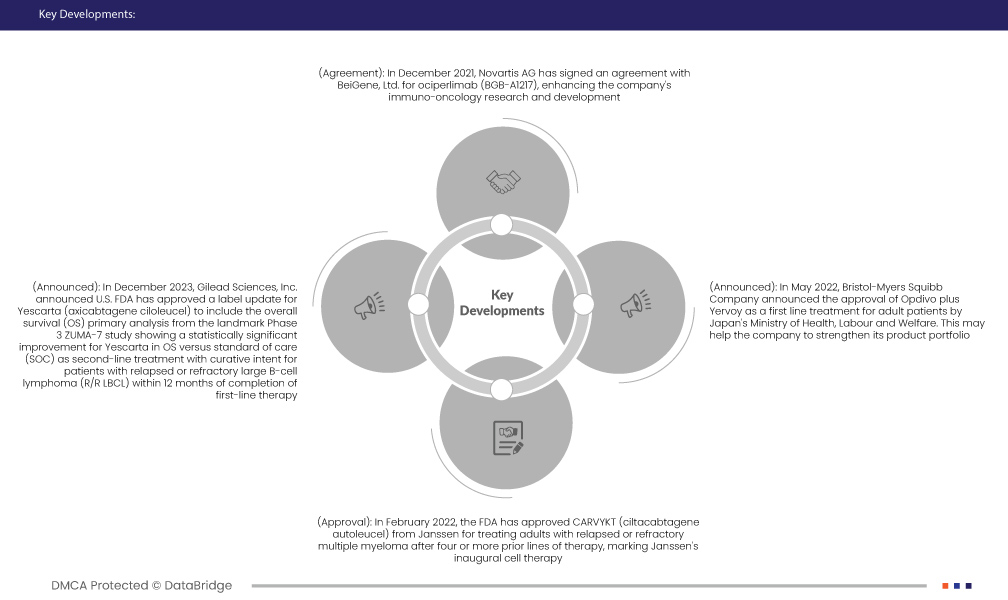암은 전 세계적으로 이병률과 사망률의 주요 원인이며, 인구 증가, 노령화, 생활 방식 변화 등의 요인으로 인해 이 지역에서 암 발생률이 증가하고 있습니다. 또한, 다른 타겟의 부담도 커지고 있습니다. 질병, 예를 들어 혈액학적 장애는 CAR-T 세포 요법으로 치료할 수도 있습니다. 이러한 증가하는 질병 부담은 CAR-T 세포 치료와 같은 혁신적이고 효과적인 치료법의 필요성을 강조하여 시장 성장을 주도합니다.
Data Bridge Market Research는 SEA CAR-T 세포치료제 시장이 2031년까지 1억 895만 달러에 도달하고, 2024~2031년 예측 기간 동안 연평균 성장률(CAGR) 30.7%로 성장할 것으로 예상합니다.
전체 보고서에 액세스 @https://www.databridgemarketresearch.com/reports/middle-east-and-africa-car-t-cell-therapy-treatment-market
Data Bridge Market Research는 다음과 같이 분석합니다. MEA CAR-T 세포치료제 시장 2027~2031년 예측 기간 동안 연평균 성장률(CAGR) 28.5%로 성장해 2031년까지 1억 569만 달러에 이를 것으로 예상됩니다.
연구의 주요 결과
- Car-T 세포 치료에 대한 인식 및 수용 증가
MEA, 사우디아라비아, SEA 지역에서 효과적인 치료법으로서 CAR-T 세포 치료법에 대한 인식과 수용이 높아지는 것은 다양한 요인에 의해 주도됩니다. 여기에는 언론 보도 강화, 교육 노력 등이 포함됩니다. 보건 의료 치료의 효과를 강조하는 성공 사례를 공유합니다. 결과적으로 환자와 의료 서비스 제공자는 특히 불응성이거나 재발한 경우 더 높은 반응률과 장기간의 관해와 같은 CAR-T 세포 치료의 잠재적 이점에 대해 더 잘 이해하고 있습니다. 또한, 이들 지역의 규제 승인 및 승인을 통해 CAR-T 세포 치료법이 합법적이고 실행 가능한 치료 옵션으로 확고히 자리 잡았습니다.
보고서 범위 및 시장 세분화
|
보고서 지표
|
세부
|
|
예측기간
|
2024년부터 2031년까지
|
|
기준 연도
|
2023년
|
|
역사적인 연도
|
2022년(2016~2021년까지 맞춤 설정 가능)
|
|
양적 단위
|
수익(백만 달러)
|
|
해당 세그먼트
|
제품(자가 CAR-T 세포 및 동종 CAR-T 세포), 구조(1세대 CAR-T 세포, 2세대 Car-T 세포, 3세대 CAR-T 세포 및 4세대 CAR-T 세포), 표적 항원( 고형 종양에 대한 항원, 혈액 악성 종양에 대한 항원 및 기타), 브랜드(Yescarta, Kymriah, Tecartus 및 기타), 치료 용도(미만성 거대 B세포 림프종, 여포성 림프종, 급성 림프구성 백혈병(ALL), 외투세포 림프종, 다발성골수종, 혈액악성종양, 폐암, 만성림프구성백혈병, 위암, 췌장암, 유방암 등), 최종사용자(병원, 전문클리닉 등), 유통채널(병원, 약국 등)
|
|
해당 국가
|
싱가포르, 인도네시아, 태국, 말레이시아, 필리핀, 베트남, 사우디아라비아, 남아프리카, UAE, 이스라엘, 쿠웨이트, 이집트, 기타 중동 및 아프리카 지역
|
|
해당 시장 참여자
|
Novartis AG(스위스), Gilead Sciences, Inc.(미국), Bristol-Myers Squibb Company(미국), Johnson & Johnson Services, Inc.(미국) 등
|
|
보고서에서 다루는 데이터 포인트
|
시장 가치, 성장률, 세분화, 지리적 범위 및 주요 플레이어와 같은 시장 시나리오에 대한 통찰력 외에도 Data Bridge Market Research에서 선별한 시장 보고서에는 심층 전문가 분석, 환자 역학, 파이프라인 분석, 가격 분석, 규제 프레임워크
|
세그먼트 분석
MEA, 사우디아라비아 및 SEA CAR-T 세포치료제 시장은 제품, 구조, 표적 항원, 브랜드, 치료 적용, 최종 사용자 및 유통을 기준으로 7개의 주목할만한 부문으로 분류됩니다. 채널.
- 제품에 따라 시장은 자가 CAR-T 세포와 동종 CAR-T 세포로 분류됩니다.
자가 CAR-T 세포 부문은 CAR-T 세포치료제 MEA, 사우디아라비아 및 SEA CAR-T 세포치료제 시장을 지배할 것으로 예상됩니다
CAR-T 세포 치료용으로 승인된 약물은 본질적으로 자가 유래이기 때문에 자가 CAR-T 세포 부문이 시장을 지배할 것으로 예상됩니다. 이들 세포는 환자 자신의 세포나 혈장에서 유래하기 때문에 제조가 용이하다. 또한 자가세포에 대한 집중적인 연구가 진행되고 있다.
- 구조에 따라 시장은 1세대 CAR-T 세포, 2세대 CAR-T 세포, 3세대 CAR-T 세포 및 4세대 CAR-T 세포로 분류됩니다.
2세대 CAR-T 세포 부문은 MEA, 사우디아라비아 및 SEA CAR-T 세포 치료 시장을 지배할 것으로 예상됩니다.
2세대 CAR-T 세포 부문은 승인된 치료법이 2세대 기반 구조인 가정과 같은 현장 진료에서의 정확성과 사용 증가로 인해 시장을 지배할 것으로 예상됩니다. 게다가 2세대는 종양 특이적 항원을 인식하고 결합하는 매우 특이적인 특성을 갖고 있습니다.
- 표적 항원을 기준으로 시장은 고형 종양 항원, 혈액 악성 종양 항원 등으로 분류됩니다. CAR-T 세포 치료에 승인된 약물이 주로 혈액 악성 종양에 사용되며 진행 중인 광범위한 연구 개발로 인해 혈액 악성 종양 부문의 항원이 시장을 지배할 것으로 예상됩니다.
- 브랜드에 따라 시장은 yescarta, kymriah, tecartus 등으로 분류됩니다.. Kymriah 부문은 MEA, 사우디아라비아 및 SEA에서 가장 높은 매출을 기록하고 있기 때문에 시장을 지배할 것으로 예상됩니다.
- 치료 적용을 기준으로 시장은 미만성 거대 B세포 림프종, 여포성 림프종, 급성 림프구성 백혈병(ALL), 외투세포 림프종, 다발성 골수종, 혈액 악성종양, 폐암, 만성 림프구성 백혈병, 위암, 췌장암으로 분류됩니다. , 유방암 및 기타. 미만성 거대 B세포 림프종 부문은 시장의 주요 수익을 차지하기 때문에 CAR-T 세포치료제 시장을 지배할 것으로 예상되며 여포성 림프종은 예카르타의 주요 적응증입니다.
- 최종 사용자를 기준으로 시장은 병원, 전문 진료소 등으로 분류됩니다. 병원 부문은 CAR-T 세포 치료에 첨단 기술 실험실을 갖춘 고도로 훈련된 전문가가 필요하기 때문에 CAR-T 세포 치료를 지배하고 있습니다. 그래서 병원은 숙련된 전문가들과 함께 모든 첨단 장비와 기술을 갖추고 있습니다.
- 유통채널을 기준으로 시장은 병원, 약국 등으로 구분됩니다. 병원 약국 부문은 병원 약국이 병원의 중심 부분이고 모든 주입 관련 및 약물 관련 배송이 약국 부서에서 판매되기 때문에 CAR-T 세포 치료 치료 시장을 지배할 것으로 예상됩니다.
주요 플레이어
Data Bridge Market Research에서는 Novartis AG(스위스), Gilead Sciences, Inc.(미국), Bristol-Myers Squibb Company(미국) 및 Johnson & Johnson Services, Inc.(미국)를 이 시장의 주요 시장 참가자로 분석합니다.
시장 개발
- 2021년 12월, Novartis AG는 BeiGene, Ltd.와 ociperlimab(BGB-A1217)에 대한 계약을 체결하여 회사의 면역항암제 연구개발을 강화했습니다. 이번 협력은 노바티스 종양학의 확장된 면역치료 플랫폼에 잠재적으로 획기적인 치료법을 통합함으로써 암 치료의 혁신을 진전시키려는 노바티스 종양학의 광범위한 이니셔티브에 기여합니다.
- 2023년 12월, Gilead Sciences, Inc.는 미국 FDA가 예스카타(axicabtagene ciloleucel)의 라벨 업데이트를 승인하여 예스카타의 통계적으로 유의미한 개선을 보여주는 랜드마크 3상 ZUMA-7 연구의 전체 생존(OS) 1차 분석을 포함한다고 발표했습니다. 1차 치료 완료 후 12개월 이내에 재발성 또는 불응성 거대 B세포 림프종(R/R LBCL) 환자에 대한 완치 목적의 2차 치료로서의 OS 대 표준 치료(SOC).
- 2022년 5월, Bristol-Myers Squibb Company는 일본 후생노동성에서 성인 환자를 위한 1차 치료제로 Opdivo와 Yervoy를 승인했다고 발표했습니다. 이는 회사가 제품 포트폴리오를 강화하는 데 도움이 될 수 있습니다.
지역분석
지리적으로 시장 보고서에서 다루는 국가는 싱가포르, 인도네시아, 태국, 말레이시아, 필리핀, 베트남, 사우디 아라비아, 남아프리카, UAE, 이스라엘, 쿠웨이트, 이집트 및 기타 중동 및 아프리카입니다.
Data Bridge 시장 조사 분석에 따르면:
바다 MEA, 사우디아라비아, SEA CAR-T 세포치료제 시장에서 가장 빠르게 성장하는 지역으로 추정됩니다
SEA는 이 지역에서 첨단 치료 옵션의 채택이 증가함에 따라 성장할 것으로 예상됩니다.
MEA, 사우디아라비아 및 SEA CAR-T 세포치료제 시장 보고서에 대한 자세한 내용을 보려면 여기를 클릭하세요.














